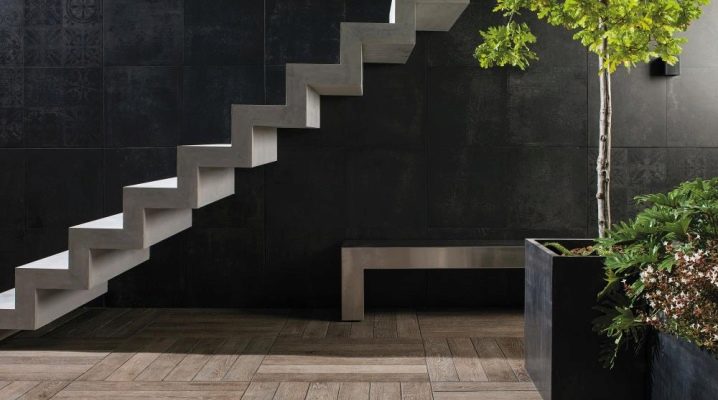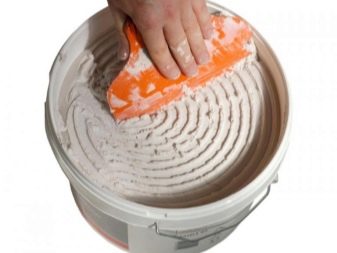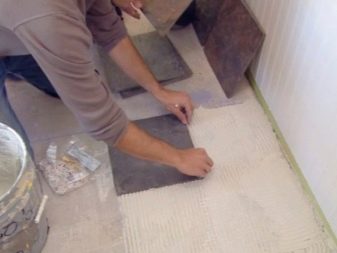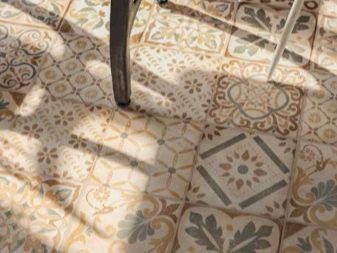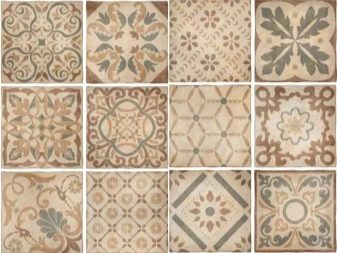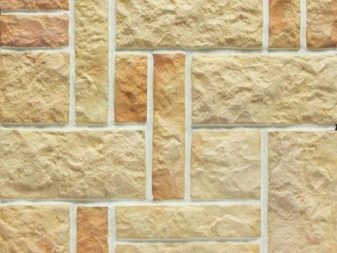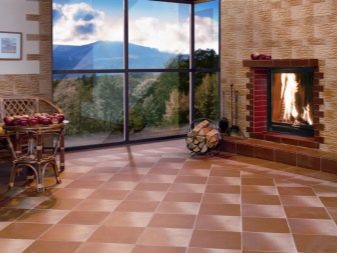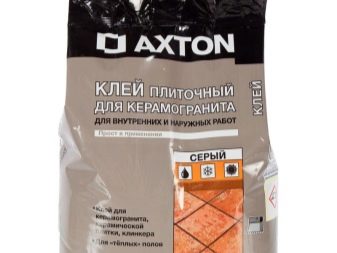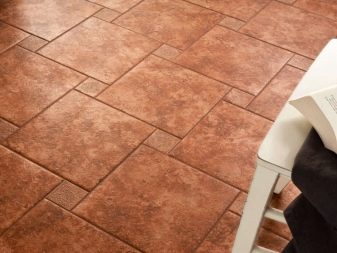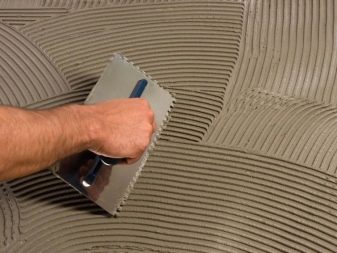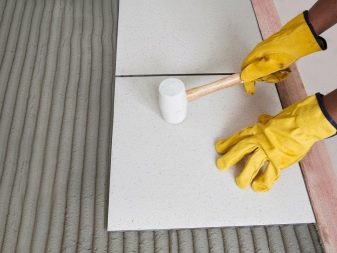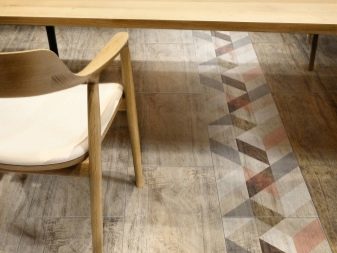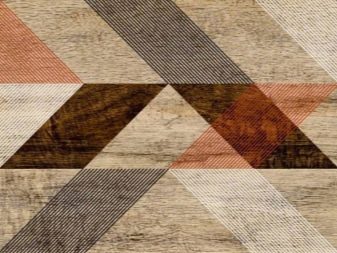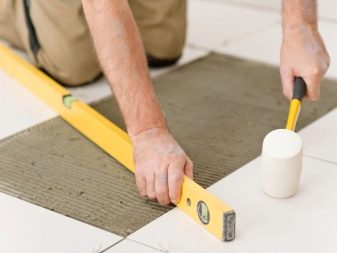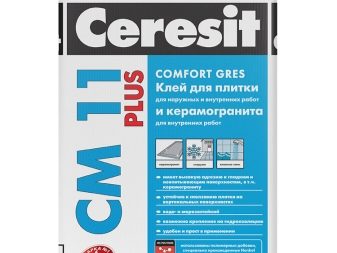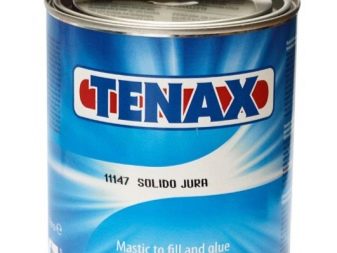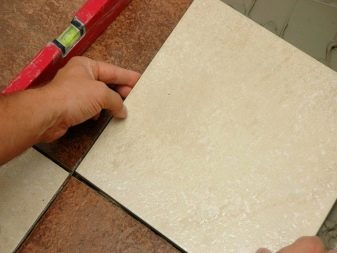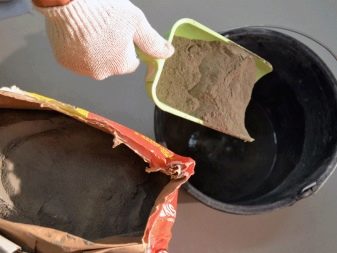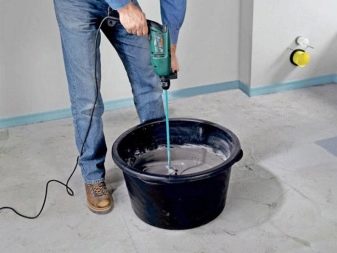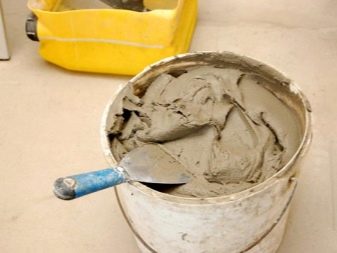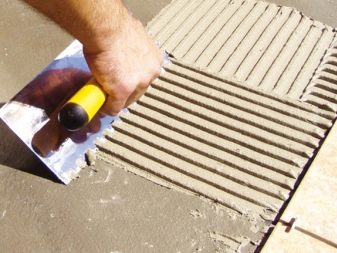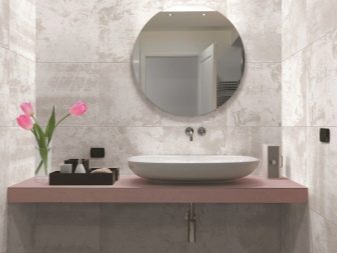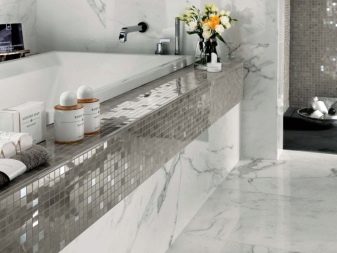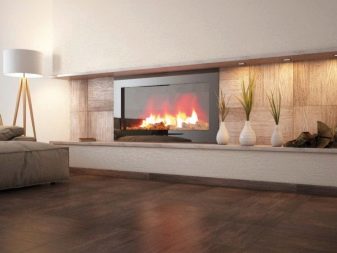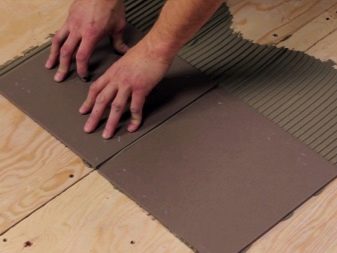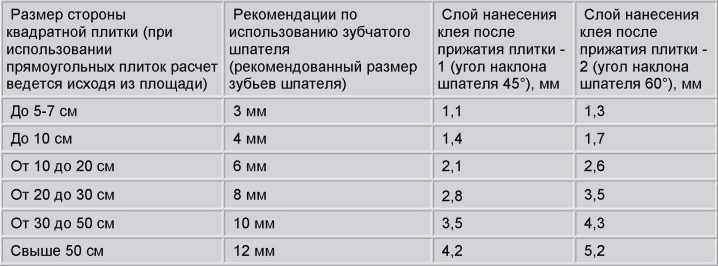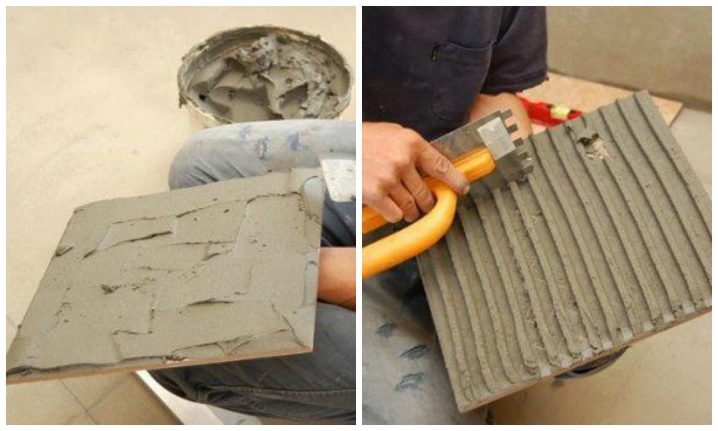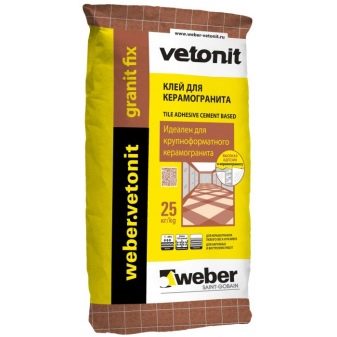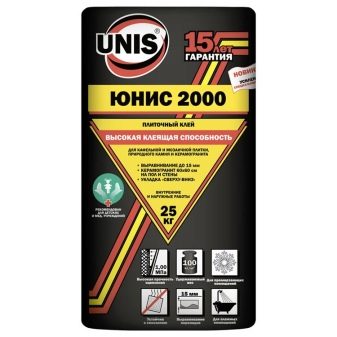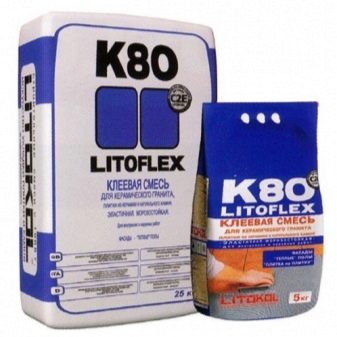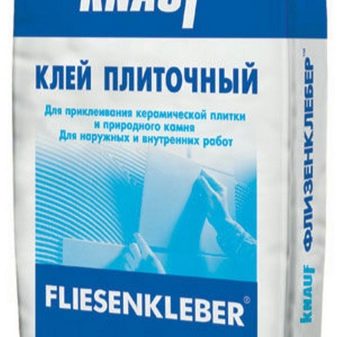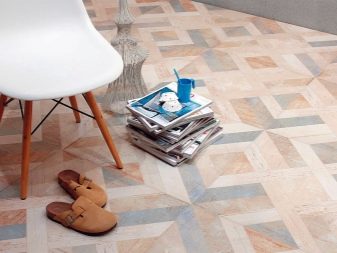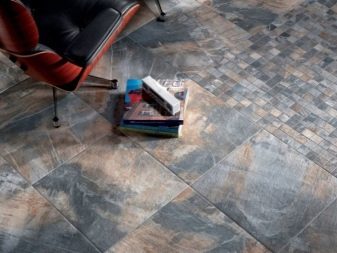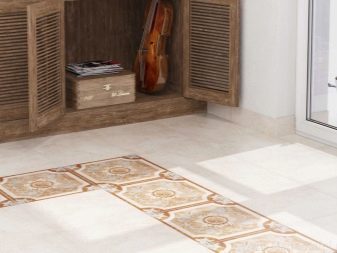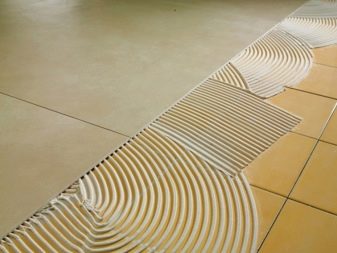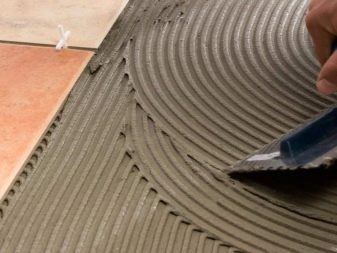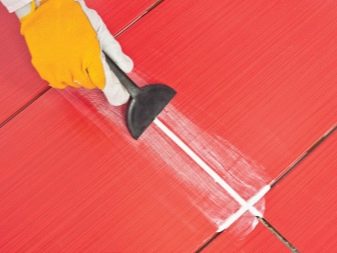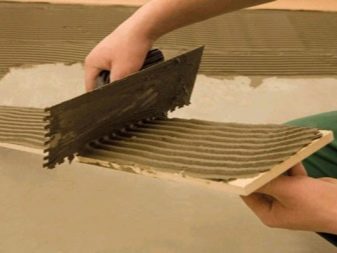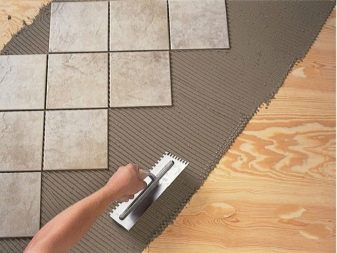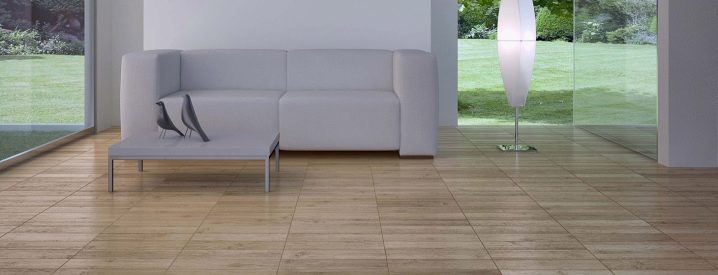Which is better to choose glue for porcelain?
Porcelain tile is a success in interior decoration. Even the high cost of this material does not stop people from using it in repairs.
Special features
For this type of coating it is important to choose the right adhesive that can withstand any loads. The attractiveness of this finishing material lies in the fact that it has high aesthetic qualities, has a rich color, is able to create an imitation of a natural base.
The features of porcelain stoneware are as follows:
-
The highest level of durability. The surface can withstand almost any weight load and mechanical stress.
-
Wear resistance. This material is difficult to detect scratches, it does not wipe.
-
Due to the inability to enter into chemical reactions with other substances used as a coating in various organizations related to the food industry.
- It has heat resistance. Able to withstand the effects of open flame.
- Does not absorb moisture. Because of this, it is optimal for finishing and exterior parts of the premises.
- Porcelain tile is frost resistant.
Because of the strong pressure applied per unit area, the glue for such a tile must withstand all the loads.
Requirements
In the process of selecting the adhesive mixture, you must take into account the characteristics of the material with which you have to work. Now in stores you can easily find adhesives that are suitable for all types of tiles. But the price of such mixtures will be very high. However, it is important to always consider the quality of the product, not its cost.
The requirements for ceramogranite adhesives should be defined:
-
The peculiarity of the base tile is the inability to absorb the adhesive composition, so the glue itself must perform this task.
-
After drying, the mixture should be firmly entrenched in the material and not deformed by the weight.
-
Frost resistance should have not only stoneware, but also glue.
-
Ability to be elastic.
-
The composition of its properties must match the qualities of the base.
-
Comfortable installation conditions.
-
The most important characteristic of the adhesive is adhesion. It gives the opportunity to firmly fasten the surface.
Kinds
The choice of a glue always depends on the place where it will be applied and to which surface it is attached. You should also consider the size of the tile, the thickness of the adhesive.
The following types of adhesives can be distinguished:
-
Two component is a dry powder that must be dissolved in water. It can consist of all sorts of components. Differs in high elasticity. Before starting work, it is necessary to mix all the ingredients using a professional mixer. For fast setting, a frost-resistant mortar is used.
-
Single component - kerabond, based on cement. Let's apply to external and internal laying of porcelain tile. Ready to work immediately after purchase. It dries long enough, it helps tiles of larger sizes to better bond with the adhesive element.
-
A variety of two-component adhesive is polyestermade on the basis of pitches.
-
Reinforced adhesive composition Designed for better grip.
-
Quick dry used for laying tiles at temperatures below 15 degrees.
For accurate fixation of porcelain stoneware choose glue with high adhesion qualities. Such products are used for laying materials from glass or natural stones.
Composition
It is important to prepare the adhesive of the desired composition for laying porcelain. At the time of purchase, the bonding mixture may be in the form of a powder. consisting of cement-sand elements, in which various polymers are also present. Due to the correct proportions of sand, cement and other substances, the required viscosity of the solution is achieved. Also on sale is a pasty base, which is ready to use.
Some additives are distinguished from the number of chemical compounds used in adhesives:
-
polymer modifiers;
-
water repellents;
-
antifreeze additives.
Which is better to choose?
It is important to consider for which room the glue will be used. So, for a bathroom, kitchen, other rooms with high humidity the moisture resistant mix is selected.In places of heavy traffic, adhesive solutions with sufficient strength are used. When finishing fireplaces, stoves it is better to use glue for porcelain stoneware with high heat resistance.
For facing open parts of a building or unheated premises, the glue mortar must be selected according to the relevant conditions.
If you need to glue porcelain tiles on plywood, then glue is selected, which includes highly elastic elements. When laying tiles on a warm floor for large-format porcelain tiles or for any heavy material, such as natural stone, it is also necessary to use a tile solution, characterized by elasticity. When required to withstand constant changes in temperature, this option is the best.
Consumption
On sale most often you can find the adhesive mixture, packaged in bags of 25 kg. Glue consumption will depend on its type and brand. On m2 goes from 2 to 5 kilograms of the composition. Porcelain stoneware has considerable weight, so it is important that the adhesive has high compressive strength. It is necessary to remember the fact that the thickness of the tile is related to the flow rate of the adhesion mixture.When forming the bonding layer, it is necessary to remember that the larger the material, the more the bonding agent will have to be spent.
For applying the composition it is recommended to use a special comb spatula, the size of which should also be chosen in accordance with the size of the layer of adhesive solution.
Choosing which glue is better to remember that during the installation process the base of the mixture is deformed. The surface is affected by a notched trowel. Often the recommended comb size is indicated on the packages themselves, which affects the consumption of the bonding agent.
Manufacturers
The most popular manufacturers of adhesive mixtures today are the following:
-
Ceresit. Suitable for installation in wet areas
-
Unis. Designed for coupling heavy plates. Let's apply both to external, and internal works.
-
Vetonit. It has moisture resistance and frost resistance, therefore it is recommended for exterior decoration.
-
Litokol. Available on the market in various varieties depending on the conditions of use.
-
"Hercules". Ideal for laying large slabs. The advantage is the affordable price.Made with the use of modern technology and the quality is not inferior to foreign manufacturers.
-
Knauf. Good for small ceramic tiles.
Reviews
In the opinion of masters, the most effective adhesive composition is products from Knauf. It has a very fast drying speed.
In the opinion of ordinary people, the glue from Ceresit is considered to be quite good, since it has versatility of use and has a good value for money.
Tips and tricks
In order not to be mistaken in the choice of glue and properly use it in work, you need to take into account the important recommendations of professionals:
-
It is always important to pay attention to the labeling of the product, because it is there indicated what surface the mixture is suitable for and what type of adhesion.
-
For laying porcelain stoneware on such bases as plastic or wood, it is better to use glue, which contains polyurethane.
-
Never need to level the walls with adhesive solutions.
-
The bonding agent is applied to the surface with a trowel, then leveled.
-
During the drying of the glue used to lay the ceramic granite tile on the floor, it is not allowed to walk on this surface for three days.
-
In the process of finishing the walls work should start from the bottom.
-
To complete the stage of fixing the tile to the base you need to grout. This is done to create a more aesthetic appearance of the coating.
-
Glue for porcelain tiles must meet the requirements of standards in construction.
-
The thickness of the adhesive mixture should be equal to the thickness of the tile.
-
The key point is the preparatory stage, which consists of stripping and leveling the base.
-
When installing small tiles, it is important that the composition is well subjected to deformation.
All the features that are inherent in porcelain stoneware will be preserved only if it is properly laid using a properly selected glue. Carrying out the adhesion of tiles with adhesive mortar, you need to take into account the level of comfort in the process of working with such compositions. Polymeric elements included in the recipe, allow installation not only for professionals, but also for beginners.
On how to choose the right tile adhesive, see the following video.
